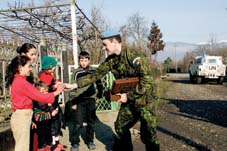UN mission leaves Abkhazia
By Temuri Kiguradze
Thursday, July 16

The mission has been suspended following Russia’s veto on its extension at the UN Security Council session of June 2009. No other country supported this step at the UN, obliging Russia to use its automatic right of veto as a permanent member of the Security Council. The Abkhazian media reports that the employees of UN human rights and political offices are already about to leave the territory. After this only technical staff overseeing the liquidation of the mission will stay. Deputy Head of the UN Mission in Georgia Joseph Stefanidis, who led the Abkhazian branch of the mission, will leave Abkhazia in the next few days and has already paid a farewell visit to Abkhazian de facto Foreign Minister Sergey Shamba.
Shamba has expressed hope that cooperation with the UN “will be continued in another form in compliance with new realities”. “We’d like a new form of UN presence to be found and we want professional people to remain in the republic because it will take much time for new people to study the situation and adapt to it, and it will just be lost time,” Shamba said. He added that, “I hope that in New York, where there are many men of experience, a right decision will be taken.”
Beslan Arshba, de facto administration head of Abkhazia's Gali district, which is mostly populated by ethnic Georgians, said the departure would negatively affect the life of local citizens in Abkhazia, who will lose their jobs. "What can be done if the UN does not want to acknowledge the modern political reality in the South Caucasus after the August 2008 events? Love cannot be forced," the official said, as quoted by the Russian RIA Novosti news agency.
Russia justified its veto on the prolongation of the UN mission by the “new realities” created in the conflict zone after the August Russian-Georgian war and the recognition of Abkhazia and South Ossetia as the independent states by Kremlin. Moscow insisted on the creation of an independent UN mission for Abkhazia which would not be connected with Tbilisi. Russia took the same position on the prolongation of the OSCE mission in Georgia and its military observing team in South Ossetia. Due to the Kremlin’s position both organisations have had to suspend their presence in Georgia, leaving the conflict regions without any kind of international monitoring.
The Georgian Government has protested against the suspension of the missions, saying that Russian wants “to get rid of international observers so it can continue the occupation of Abkhazia and South Ossetia.” Russia’s actions have been condemned by the international community, including the EU and the USA. UK Foreign Secretary David Miliband accused Russia of using its veto power at the UN to "pursue its own narrow interests".
The UN mission has been working in Abkhazia since 1993, when it was deployed to monitor an earlier ceasefire between Abkhaz separatists and Georgian forces.
